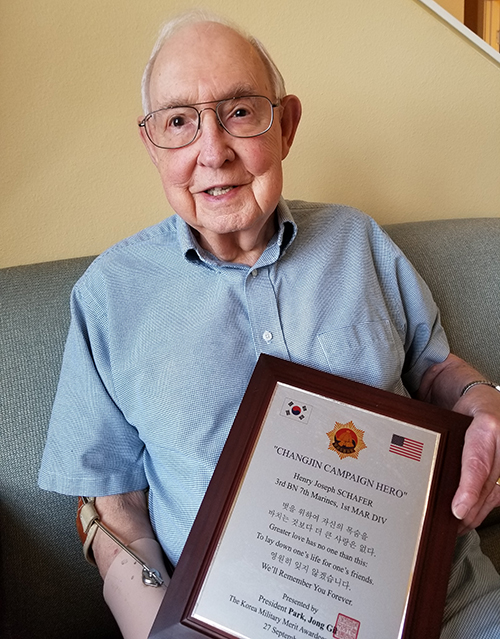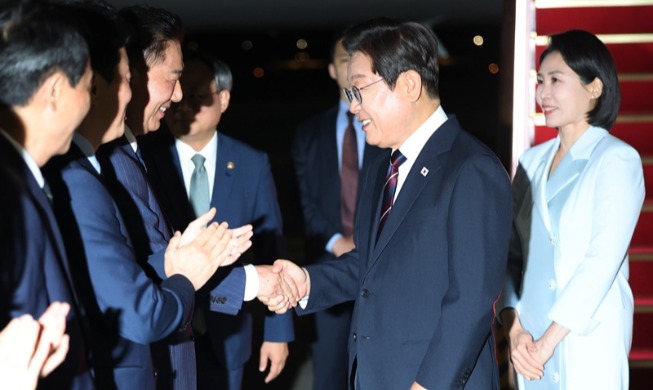
Henry Schafer, an American veteran of the Korean War, on June 13 at his U.S. home holds a honorary plaque he received during his visit to Korea in September 2019.
By Lee Hana
Photos = Henry Schafer
"I think it's about time. I'm all for it."
This is what Henry Schafer, an American veteran of the Korean War, said when asked about converting the 1953 armistice that ended the 1950-53 conflict into a peace treaty.
In a written interview with Korea.net on June 7, he said, "I'm not familiar with the terms or current discussions of the armistice agreement between the United Nations, North Korea and China. However, a great deal of time has passed with South Korea living under the threat of further war with an armistice in which it's not a signatory."
"Korea has developed into a successful, independent and democratic nation. It should define the terms of its relationship with neighboring countries directly."
He added, "Koreans should celebrate the 70th anniversary of the (outbreak of the) Korean War because it made them what they are today."
Seventy years have passed since civil war broke out on the Korean Peninsula, but a formal end to the war remains elusive.
Seoul has pushed for the conversion of the armistice into a peace treaty, while insisting that a declaration of an end to the war is a necessary halfway point.
On June 15, the 20th anniversary of the June 15th North-South Joint Declaration reached in the first inter-Korean summit, some 174 members of parliament in Seoul, including those from the ruling Democratic Party, submitted a resolution on a formal end to the Korean War.
Schafer, a retired U.S. Marine sergeant who turns 89 in October, shared his experiences from the war that splintered the peninsula.

Henry Schafer poses at his family home in Tacoma, Washington, in June 1951 (left) and in uniform while at Naval Hospital Oakland in Oakland, California, in September 1951 (middle and right).
Schafer enlisted in the Marine Corps Reserves in 1948. When war broke out on the peninsula on June 25, 1950, he was summoned to active duty in the 7th Marines in August of that year just a few months shy of 19.
His division fought battles chasing North Korean forces above the 38th parallel, which divides the Koreas today. "It was a miserable battle. It was blazing hot and the rice fields we passed stunk from night soil," he said.
Schafer thought that on his birthday, Oct. 5, 1950, the war was over since U.N. forces had beaten back the North Koreans to the 38th parallel. But the conflict's most harrowing battle was just around the corner. In a surprise attack, more than 100,000 Chinese troops trapped U.S. forces in the area around Changjin Lake.
The site of the Battle of Jangjin Reservoir (Battle of Chosin Reservoir) was the rocky highlands of Changjin-gun County, Hamgyeongnam-do Province in present-day North Korea at an altitude of around 1,000 m. Snow fell from October in this region, with temperatures falling to bone-chilling subzero levels. Such harsh conditions tormented all soldiers on the ground.
"Both the Chinese and the Americans were poorly armed, and our guns jammed in near 30 degrees below zero temperatures," he said.
On Dec. 1, after being surrounded by Chinese forces in the village of Yudam-ni northwest of the lake, the Marines were ordered to withdraw. Schafer was last to hear of the retreat.
"As I jumped out of a foxhole to another position, a Chinese soldier shot me with an American submachine gun from 10 feet (3.04 m) away. I got hit twice in one arm, once in the other arm and ran down the hill. Then I got hit in the side and was knocked down 20 feet (6.08 m) by the impact. I couldn't walk after that."
Fortunately, Schafer was seen by a fellow Marine, who skidded him down the hill and placed him on a jeep trailer. There, Schafer received a shot of morphine and last rites.
He was airlifted out of Changjin to a hospital in Japan, then sent back to the U.S. Back home, he underwent 13 operations over some 10 months, culminating in amputations of an arm, a leg and part of a foot.

Henry Schafer provided this newspaper clipping from The Wall Street Journal to Korea.net showing him saluting U.S. Army veterans of the Korean War on Sept. 27, 2019, at a ceremony in Seoul to mark the 69th anniversary of the Battle of Jangjin Reservoir. He visited Korea last year under an invitation from the Korean government.
"Veterans may not talk about their wartime experiences because no one understands -- you just had to be there," he said.
Retiring from the Marines in 1951, Schafer earned a bachelor's in mathematics and a master's in education and started a teaching career.
"The Korean War had a profound impact on my life. My physical limitations limited my career. I wanted to be a civil engineer, but had a successful career teaching mathematics for 34 years," he said.
Last year, Schafer returned to Korea for the first time in 69 years thanks to an invitation from the Korean government.
"Returning to Korea last year, I was proud of what I did and very honored with their treatment of me. I was overwhelmed with their gratitude," he said, adding that he has always been proud to have served his country to help the Korean people.
"I felt I was one of the 'lucky ones' coming out alive, and that gave me a very optimistic outlook on life."
hlee10@korea.kr
Most popular
- Military discharge sets stage for reunion of all 7 BTS members
- 'We are back!' BTS Festa heralds hyped return of K-pop phenom
- Presidents Lee, Trump discuss tariff deal in first phone talks
- President Lee leaves for G7 Summit in Canada on first int'l trip
- 'Maybe Happy Ending' wins 6 Tonys including Best Musical
